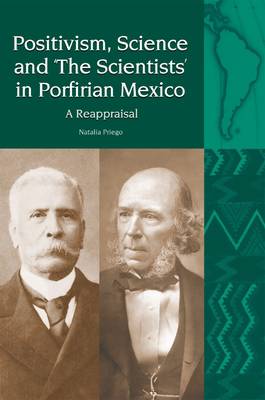
- Retrait gratuit dans votre magasin Club
- 7.000.000 titres dans notre catalogue
- Payer en toute sécurité
- Toujours un magasin près de chez vous
- Retrait gratuit dans votre magasin Club
- 7.000.0000 titres dans notre catalogue
- Payer en toute sécurité
- Toujours un magasin près de chez vous
104,95 €
+ 209 points
Description
This innovative monograph is of major significance for not only all students and academics who undertake research on the history of Mexico during the half-century prior to the onset in 1910 of the Mexican Revolution but also the parallel community of scholars who specialise in the history of ideas, philosophy and science throughout Latin America in this period. Its principal purpose is to revisit the influential thesis of the Mexican philosopher Leopoldo Zea that the political-ideological group dubbed 'the scientists' by their opponents were guided by positivist ideas, especially those of the English philosopher Herbert Spencer. Its structure embraces, first, an overview of previous research upon the formation and differentiation of 'the scientists' and the black legend surrounding their legitimisation of the dictatorship of Porfirio Díaz, president of Mexico for 31 years until going into exile in 1911 after 27 uninterrupted years in the presidency, followed by an analysis, based upon primary sources that include Spencer's journal articles, of the origins of the theory of evolution long before Darwin and, in particular, the significant impact of Bacon and Newton upon the philosophy of Spencer. Having established what Spencer actually believed and wrote, the book then provides an analysis of the prolific writings, both published and archival, of two of the leading, although ideologically different, representatives of 'the scientists', Francisco Bulnes and Justo Sierra, demonstrating that their eclectic discourses used the ideas of the American Social Darwinists, and those from Spencer, Charles Darwin, Auguste Comte, and other European writers whose ideas reached them in a fragmented and second-hand fashion in an arbitrary fashion to support their conservative views of the need to promote political order and socio-economic progress, notwithstanding their belief that the ethnic make-up of Mexican society was a barrier to the country's modernisation. It concludes that far from forming a homogeneous elite guided by positivist ideas, 'the scientists' lacked a clear leader, and had an ambivalent relationship with Díaz. This revisionist book is of relevance for not only Mexicanists but also students of positivism in other Latin American countries - notably Brazil, because hitherto Zea's assessment of the Spencerianism of 'the scientists' has tended to be applied to the region as a whole by a process of inaccurate extrapolation.
Spécifications
Parties prenantes
- Auteur(s) :
- Editeur:
Contenu
- Nombre de pages :
- 272
- Langue:
- Anglais
- Collection :
- Tome:
- n° 15
Caractéristiques
- EAN:
- 9781781382561
- Date de parution :
- 29-01-16
- Format:
- Livre relié
- Format numérique:
- Genaaid
- Dimensions :
- 157 mm x 236 mm
- Poids :
- 430 g

Les avis
Nous publions uniquement les avis qui respectent les conditions requises. Consultez nos conditions pour les avis.






